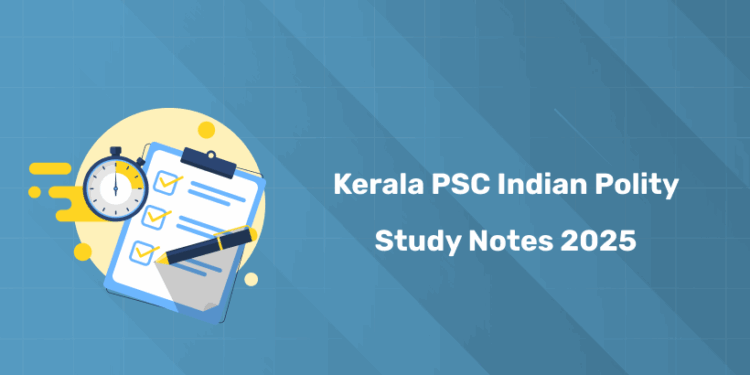Table of Contents
Indian Polity plays a crucial role in Kerala PSC exams, as questions on the Constitution, governance, fundamental rights, and duties are frequently asked. Understanding key concepts helps aspirants answer both MCQs and descriptive questions accurately. Get exclusive access to Indian Polity notes prepared by Entri App experts and enhance your Kerala PSC exam preparation with high-yield, MCQ-based revision material.
GET 7 day KERALA PSC course trail!
Kerala PSC Notification 2025 Highlights
| Aspect | Details |
|---|---|
| Exam Conducting Body | Kerala Public Service Commission (Kerala PSC) |
| Exam Level | State-level competitive examination |
| Exam Types | Preliminary, Main (Written), and Interview/Physical Test (as applicable) |
| Eligibility | 10th Grade Minimum (Varies by post) |
| Age Limit | 18–36 years (Varies by post) |
| Application Mode | Online through Kerala PSC official website |
| Exam Pattern | Objective (MCQs) + Descriptive (Main) + Interview/Physical for some posts (Varies by post) |
| Syllabus | General Knowledge, General English, Reasoning, Aptitude, Optional Subjects |
| Frequency | Annually / as per vacancy announcements |
| Official Website | www.keralapsc.gov.in |
Kerala PSC Indian Polity Study Notes 2025 – Free PDF
1: Who was the first woman President of India?
Download the Indian Polity notes PDF prepared by Entri App experts to access MCQ-based, high-yield questions selected from repeated Kerala PSC papers. Keep this PDF handy for quick revision and practice, and strengthen your preparation for the exam with carefully curated content.
Free UPSKILLING Courses!
Take your first step toward mastering in-demand skills, acing interviews, and securing top-tier jobs with Entri's free upskilling courses.
Start Learning!Kerala PSC Indian Polity Quiz 2025 – Free Questions & Answers for Exam Prep
1. Which article of the Indian Constitution deals with the right to equality?
Answer: Article 14
2. Who is known as the “Father of the Indian Constitution”?
Answer: Dr. B.R. Ambedkar
3. What is the maximum strength of the Lok Sabha as per the Constitution?
Answer: 552 members
4. How many Schedules are there in the Indian Constitution?
Answer: 12 (originally; now 12+ additions make 12-16 depending on amendments – mention 12 for basics)
5. Which part of the Constitution deals with the Fundamental Rights?
Answer: Part III
6. Who appoints the Chief Election Commissioner of India?
Answer: President of India
7. What is the term of office of a Rajya Sabha member?
Answer: 6 years
8. Which amendment gave the right to education as a Fundamental Right?
Answer: 86th Amendment Act, 2002
9. How many Union Territories are there in India as of 2025?
Answer: 8
10. What is the maximum age limit for the President of India?
Answer: 35 years
11. Who presides over the joint sitting of both Houses of Parliament?
Answer: The Speaker of the Lok Sabha
12. Which Article of the Constitution abolishes untouchability?
Answer: Article 17
13. How many types of emergencies are mentioned in the Indian Constitution?
Answer: Three – National, State, and Financial Emergency
14. Who is the guardian of the Constitution of India?
Answer: The Supreme Court of India
15. What is the minimum age to become a member of the Lok Sabha?
Answer: 25 years
16. Which Schedule of the Constitution contains provisions regarding the division of powers between the Union and the States?
Answer: Seventh Schedule
17. How many Fundamental Duties are listed in the Constitution?
Answer: 11
18. Which Article of the Constitution provides for the protection of minorities?
Answer: Article 29 and 30
19. Who was the first Deputy Prime Minister of India?
Answer: Sardar Vallabhbhai Patel
20. Which part of the Constitution deals with the Directive Principles of State Policy?
Answer: Part IV
Kerala PSC Indian Polity MCQs 2025 – Questions & Answers
1. Who has the power to dissolve the Lok Sabha?
A) Prime Minister
B) President
C) Chief Justice of India
D) Speaker of Lok Sabha
2. The “Basic Structure” doctrine of the Constitution was propounded in which case?
A) Kesavananda Bharati vs. State of Kerala
B) Golaknath vs. Punjab
C) Minerva Mills vs. Union of India
D) Indira Gandhi vs. Raj Narain
3. Which part of the Constitution deals with the Union and its territory?
A) Part I
B) Part II
C) Part III
D) Part IV
4. Who presides over the Rajya Sabha sessions in the absence of the Vice President?
A) Prime Minister
B) Deputy Chairman
C) Speaker of Lok Sabha
D) Chief Justice of India
5. The 73rd Constitutional Amendment deals with:
A) Fundamental Rights
B) Panchayati Raj
C) Directive Principles
D) Election Commission
6. The President of India can declare National Emergency under which Article?
A) Article 352
B) Article 356
C) Article 360
D) Article 370
7. Which constitutional amendment lowered the voting age from 21 to 18 years?
A) 61st Amendment
B) 73rd Amendment
C) 42nd Amendment
D) 86th Amendment
8. Who has the power to impeach the President of India?
A) Prime Minister
B) Parliament
C) Supreme Court
D) Election Commission
9. The Eighth Schedule of the Constitution lists:
A) Fundamental Rights
B) Languages recognized by the Constitution
C) Union Territories
D) Schedules of States
10. Which Article provides for the establishment of the Finance Commission?
A) Article 280
B) Article 300
C) Article 275
D) Article 26











